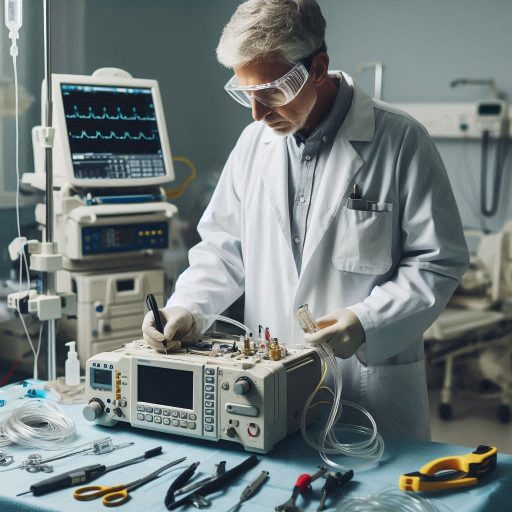Introduction
The Topic of Advancement Opportunities in the Field of Lab Technology
Advancement opportunities in lab technology are essential for career progression.
As technology evolves, lab tech professionals have numerous pathways to grow and advance in their careers.
Exploring these opportunities is crucial for staying current and competitive in the field.
The Importance of Career Growth and Development in This Field
Career growth and development are critical in lab technology for several reasons.
They enhance job satisfaction, lead to higher responsibilities, and improve earning potential.
Staying updated with advancements and acquiring new skills can significantly impact a professional‘s success and longevity in the industry.
The Various Ways Lab Tech Professionals Can Advance in Their Careers
This blog will outline the key strategies for advancing in lab tech.
We will cover the importance of education, specialization, and hands-on experience.
Additionally, we‘ll highlight the role of leadership skills, continuing education, networking, and research.
Understanding these elements will help lab tech professionals navigate their career paths and achieve long-term success.
Education and Training
The Importance of Obtaining a Relevant Degree or Certification in Lab Technology
In lab technology, obtaining a relevant degree or certification is crucial for career advancement.
A foundational step is earning an associate degree or certification in lab technology.
This initial qualification provides essential skills and knowledge, laying the groundwork for further specialization and career growth.
It ensures you meet industry standards and enhances your credibility in the field.
Different Educational Paths That Can Lead to Advancement Opportunities, Such as Obtaining a Bachelor‘s or Master‘s Degree
To advance in lab technology, consider pursuing a bachelor‘s degree in a related field.
A bachelor‘s degree opens doors to more advanced positions and specialized roles.
It also enhances your understanding of complex lab techniques and technologies.
With a bachelor‘s degree, you can move into supervisory or managerial roles, leading larger teams and handling more complex projects.
A master‘s degree offers even greater opportunities for advancement.
This degree allows you to specialize in areas like clinical research or forensic science.
It prepares you for leadership roles and research positions, equipping you with advanced skills and knowledge.
Master‘s degree holders often engage in cutting-edge research or oversee significant projects, driving innovation in the field.
The Importance of Continuing Education and Professional Development to Stay Current in the Field
Continuing education is vital in this ever-evolving field.
New technologies and methods emerge regularly, making it essential to stay updated.
Enroll in workshops, seminars, or online courses to enhance your skills and knowledge.
Professional certifications, such as those from the American Society for Clinical Pathology, can also boost your career prospects and demonstrate your commitment to the field.
Professional development helps you stay competitive and relevant.
It shows your dedication to advancing your career and adapting to industry changes.
Seek out opportunities for training in emerging technologies or advanced lab techniques.
Networking with industry professionals can also provide insights into new opportunities and trends, further supporting your career growth.
In summary, education and training are pivotal for advancement in lab technology.
Start with foundational degrees and certifications, then pursue higher education for greater opportunities.
Continuing education and professional development keep you at the forefront of the field.
Investing in your education today can lead to significant career growth and opportunities in the future.
Read: Networking Tips for Surveying and Mapping Professionals
Specialization
How Specializing in a Specific Area of Lab Technology Can Lead to Advancement Opportunities
Specializing in a specific area of lab technology can significantly enhance your career prospects.
Focused expertise allows you to become a go-to professional in that niche, making you indispensable in your field.
Specialization often leads to roles with greater responsibilities, higher salaries, and more career advancement opportunities.
It also positions you as a subject matter expert, which can open doors to leadership roles and specialized projects.
Different Areas of Specialization Within the Field, Such as Clinical Chemistry, Microbiology, or Hematology
Several areas within lab technology offer specialization opportunities.
Clinical chemistry involves analyzing bodily fluids to diagnose diseases and monitor health conditions.
This specialization requires in-depth knowledge of chemical reactions and instrumentation used in testing.
Microbiology focuses on studying microorganisms, such as bacteria and viruses, to understand their effects on health.
Specialists in this area work in diagnostic labs, research settings, or public health.
Hematology deals with blood and its disorders.
Hematology specialists conduct tests related to blood diseases, such as anemia and leukemia.
They often work in hospitals, research labs, and specialized diagnostic centers.
The Benefits of Becoming an Expert in a Particular Area and How It Can Open Doors for Career Advancement
Becoming an expert in a particular area brings several benefits.
Expertise in a niche field often leads to higher recognition within the industry.
It allows you to handle complex cases and advanced procedures, setting you apart from generalists.
Specialists are frequently sought after for their advanced skills and knowledge, which can lead to leadership positions or roles in research and development.
Moreover, specialization can lead to better job security and higher earning potential.
Employers value specialists for their ability to address specific challenges and contribute to specialized projects.
Your expertise can also make you a valuable asset for consulting roles or advanced research positions, further enhancing your career opportunities.
In summary, specialization in lab technology offers numerous advancement opportunities.
By focusing on areas like clinical chemistry, microbiology, or hematology, you can position yourself as an expert in your field.
This expertise leads to higher recognition, better job security, and increased career growth.
Embracing specialization can open doors to leadership roles, research opportunities, and advanced projects, driving your career forward.
Read: Field vs. Office Work in Surveying and Mapping
Professional Experience
The Importance of Gaining Hands-On Experience in a Lab Setting
Gaining hands-on experience in a lab setting is crucial for career growth in lab technology.
Practical experience allows you to apply theoretical knowledge to real-world situations.
It helps you develop essential skills, such as operating lab equipment, conducting experiments, and analyzing data.
Working directly in a lab environment enhances your problem-solving abilities and prepares you for complex tasks and unexpected challenges.
The Different Levels of Lab Tech Positions and How Advancing Through These Roles Can Lead to Higher-Level Opportunities
Lab tech positions vary in responsibility and complexity.
Entry-level roles often involve routine tasks and basic procedures, providing a foundation for understanding lab operations.
As you gain experience, you can advance to more specialized roles, such as senior lab technician or laboratory supervisor.
These positions involve overseeing lab activities, managing teams, and handling advanced projects.
Advancing through these levels often leads to higher-level opportunities, such as lab manager or director, where you can influence lab operations and strategic decisions.
The Value of Internships, Fellowships, and On-the-Job Training in Gaining Valuable Experience
Internships and fellowships offer valuable opportunities to gain experience and build your professional network.
Internships provide hands-on training and exposure to various lab environments, helping you understand different aspects of lab work.
Fellowships often focus on specialized areas, offering in-depth experience and advanced training.
On-the-job training is also essential for career advancement.
It allows you to learn from experienced professionals, gain practical skills, and adapt to the specific needs of your employer.
Continuous on-the-job training helps you stay updated with the latest technologies and techniques, enhancing your expertise and career prospects.
In summary, professional experience is vital for advancing in lab technology.
Gaining hands-on experience in a lab setting builds your skills and prepares you for more complex tasks.
Advancing through various lab tech positions leads to higher-level opportunities and increased responsibilities.
Internships, fellowships, and on-the-job training provide valuable experience and professional development.
Investing in these experiences can significantly enhance your career growth and open doors to advanced roles in the field.
Read: Importance of Accuracy in Surveying and Mapping

Leadership and Management
The Opportunities for Lab Tech Professionals to Move into Leadership and Management Roles
Lab tech professionals have ample opportunities to move into leadership and management roles.
Starting as a lab technician, you can progress to positions such as senior lab technician or lab supervisor.
These roles involve overseeing daily operations, managing teams, and ensuring quality control.
With additional experience and qualifications, you can advance to roles like lab manager or laboratory director, where you‘ll be responsible for strategic planning, budgeting, and overall lab administration.
The Skills and Qualifications Needed to Transition into Supervisory or Managerial Positions
Transitioning to supervisory or managerial positions requires a combination of skills and qualifications.
Strong leadership skills are essential for guiding and motivating teams.
Effective communication skills are crucial for managing staff and coordinating with other departments.
Problem-solving abilities help in addressing and resolving issues that arise in the lab.
Additionally, managerial roles often require a solid understanding of lab operations and regulations.
Advanced degrees, such as a master‘s degree in a related field, can enhance your qualifications.
Certifications in management or project management can also be beneficial.
Experience in project management, budgeting, and strategic planning further prepares you for these roles.
The Benefits of Taking on Leadership Responsibilities, Such as Increased Pay, Job Satisfaction, and Career Growth
Taking on leadership responsibilities offers several benefits.
Increased pay is a significant advantage, as managerial roles often come with higher salaries and better benefits.
Leadership positions also provide greater job satisfaction, as you‘ll have the opportunity to influence lab operations and contribute to the success of your team.
Career growth is another key benefit.
Leadership roles allow you to gain valuable experience in management, setting the stage for further advancement.
You may have opportunities to move into higher executive roles or specialize in strategic areas of lab technology.
Taking on leadership responsibilities can also enhance your professional reputation and expand your network within the industry.
In summary, moving into leadership and management roles offers exciting opportunities for lab tech professionals.
Developing skills in leadership, communication, and problem-solving, along with obtaining relevant qualifications, prepares you for these advanced roles.
The benefits of leadership include increased pay, job satisfaction, and significant career growth.
Embracing these responsibilities can lead to a fulfilling and successful career in lab technology.
Read: Surveying and Mapping Technician: Job Satisfaction
Continuing Education and Certifications
The Importance of Pursuing Additional Certifications and Credentials in Lab Technology
Pursuing additional certifications and credentials in lab technology is crucial for career advancement.
Certifications validate your expertise and commitment to the field, demonstrating to employers that you have advanced skills and knowledge.
They also help you stay current with industry standards and technological advancements.
Continued education ensures that you remain competitive and can handle evolving lab techniques and equipment.
Transform Your Career Today
Unlock a personalized career strategy that drives real results. Get tailored advice and a roadmap designed just for you.
Start NowThe Different Certifications Available, Such as Medical Laboratory Scientist (MLS) or Clinical Laboratory Scientist (CLS)
Several certifications can enhance your qualifications and career prospects.
The Medical Laboratory Scientist (MLS) certification is highly regarded, focusing on advanced laboratory techniques and complex testing procedures.
This certification prepares you for roles in various lab settings, including hospitals and research facilities.
The Clinical Laboratory Scientist (CLS) certification is another valuable credential, emphasizing clinical laboratory practices and patient care.
CLS certification demonstrates proficiency in conducting tests and analyzing results, making it ideal for those working directly in clinical environments.
Other certifications, such as the American Society for Clinical Pathology (ASCP) certification, are also available.
These certifications cover different specialties and provide additional credentials to support career growth.
How Obtaining These Certifications Can Enhance Career Opportunities and Increase Earning Potential
Obtaining certifications like MLS or CLS can significantly enhance your career opportunities.
These credentials often lead to advanced roles, such as senior technician, laboratory manager, or specialized consultant.
Employers value certified professionals for their proven expertise and dedication, which can lead to increased job responsibilities and promotions.
Certifications also contribute to higher earning potential.
Professionals with advanced credentials typically earn more than those without.
The added value of specialized skills and knowledge often translates to higher salaries and better job benefits.
Additionally, certifications can open doors to roles in research, academia, or leadership positions within the lab industry.
In summary, pursuing additional certifications and credentials in lab technology is essential for career advancement.
Certifications such as MLS and CLS validate your expertise and keep you current with industry standards.
They enhance career opportunities, lead to higher-level roles, and increase earning potential.
Investing in these certifications can significantly impact your professional growth and success in the field.
Learn More: Transportation Engineering and Smart City Development
You Might Also Like: How to Choose the Right Aerospace Engineering Program
Networking and Professional Development
The Importance of Networking Within the Lab Tech Community
Networking within the lab tech community is crucial for career development.
Building a strong professional network allows you to connect with peers, mentors, and industry leaders.
It helps you stay informed about the latest trends, technologies, and job opportunities in the field.
Effective networking also provides a platform for exchanging ideas, gaining insights, and fostering professional relationships that can support your career growth.
The Benefits of Joining Professional Organizations, Attending Conferences, and Participating in Industry Events
Joining professional organizations offers numerous benefits.
Organizations such as the American Society for Clinical Pathology (ASCP) or the American Association for Clinical Chemistry (AACC) provide resources, certification opportunities, and a network of professionals.
Membership often includes access to journals, industry updates, and exclusive events.
Attending conferences and industry events allows you to learn from experts, explore new technologies, and expand your knowledge.
These events also provide opportunities for networking with professionals and potential employers.
Participating in workshops and seminars at these events can enhance your skills and keep you current with industry advancements.
How Networking Can Lead to Job Opportunities, Mentorship, and Professional Growth
Networking can significantly impact your career trajectory.
Strong connections in the lab tech community can lead to job opportunities through referrals and recommendations.
Many positions are filled through professional networks before they are advertised publicly.
Networking also opens doors to mentorship opportunities.
Experienced professionals can offer guidance, advice, and support, helping you navigate your career path and achieve your goals.
Mentorship provides valuable insights into career development and helps you avoid common pitfalls.
Furthermore, networking facilitates professional growth by exposing you to new ideas, best practices, and industry trends.
Engaging with a diverse network of professionals can inspire you to pursue new challenges and opportunities, leading to personal and career development.
In summary, networking and professional development are essential for advancing in lab technology.
Building a strong network within the community connects you with peers, mentors, and opportunities.
Joining professional organizations, attending conferences, and participating in industry events offer numerous benefits, including job prospects, mentorship, and growth.
Investing in these networking strategies can significantly enhance your career and professional success.
Research and Innovation
How Lab Tech Professionals Can Contribute to Research and Innovation Within the Field
Lab tech professionals play a vital role in research and innovation.
Their expertise in laboratory techniques and data analysis is crucial for advancing scientific knowledge.
By participating in research projects, lab techs contribute to developing new methodologies, improving existing technologies, and discovering novel applications for lab equipment.
Their work supports breakthroughs in various fields, including medicine, environmental science, and biotechnology, driving progress and innovation within the industry.
The Opportunities for Lab Tech Professionals to Participate in Research Studies, Clinical Trials, and Development Projects
Lab tech professionals have numerous opportunities to engage in research studies, clinical trials, and development projects.
In research studies, they often handle sample collection, data analysis, and experimental procedures, contributing to the study‘s success.
Participation in clinical trials allows lab techs to work on evaluating new treatments or diagnostic tools, providing critical data that influences medical practice.
Development projects offer lab techs the chance to work on creating and testing new technologies or improving existing lab instruments.
These projects can involve collaborating with engineers, scientists, and researchers to refine lab processes, design innovative tools, and enhance the efficiency of laboratory work.
Involvement in such projects positions lab techs at the forefront of technological advancements.
The Significance of Staying Informed About Advancements in Lab Technology and How It Can Lead to Career Advancement
Staying informed about advancements in lab technology is essential for career advancement.
The field of lab technology is constantly evolving, with new techniques, equipment, and discoveries emerging regularly.
By keeping up-to-date with these advancements, lab techs can maintain their expertise and adapt to new challenges.
Being knowledgeable about the latest technologies enhances your ability to contribute to innovative projects and research.
It also positions you as a valuable asset to employers who seek professionals capable of leveraging cutting-edge tools and methods.
Continuous learning and adaptation can lead to opportunities for career growth, including roles in research leadership, specialized technical positions, or consulting.
In summary, lab tech professionals have significant opportunities to contribute to research and innovation.
Engaging in research studies, clinical trials, and development projects expands their roles and impact within the field.
Staying informed about technological advancements ensures that lab techs remain at the cutting edge of the industry, leading to career advancement and enhanced professional prospects.
Conclusion
The Key Points Discussed in the Blog Post About Advancement Opportunities in Lab Tech
Advancement in lab tech requires a strategic approach.
Key elements include education, specialization, and experience.
Education provides the foundational knowledge necessary for a career in lab tech.
Specialization allows you to focus on specific areas, enhancing your expertise and value.
Experience builds practical skills and professional credibility.
The Importance of Education, Specialization, Experience, Leadership, Continuing Education, Networking, and Research in Advancing a Career in Lab Technology
Education and specialization are critical for gaining and enhancing expertise.
Experience, coupled with leadership skills, can lead to advanced roles and responsibilities.
Continuing education is essential for staying updated with new technologies and techniques.
Networking opens doors to new opportunities and collaborations, while engaging in research positions you as an industry innovator.
Encouragement to Explore the Various Pathways to Career Growth and Development in the Field of Lab Technology
Explore various pathways for career growth in lab tech.
Pursue additional certifications, specialized training, and mentorship opportunities.
Stay proactive in learning, adapt to new advancements, and seize opportunities for professional development to achieve long-term success.
[E-Books for Sale]
The Big Book of 500 High-Paying Jobs in America: Unlock Your Earning Potential
$19.99 • 500 High-Paying Jobs • 330 pages
Explore 500 high-paying jobs in America and learn how to boost your career, earn more, and achieve success!
See All 500 High-Paying Jobs of this E-Book
1001 Professions Without a Degree: High-Paying American Jobs You Can Start Now
$19.99 • 1001 Professions Without a Degree • 174 pages
Discover 1001 high-paying jobs without a degree! Unlock career tips, skills, and success strategies for just $19.99!




